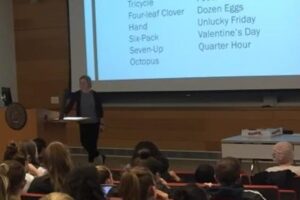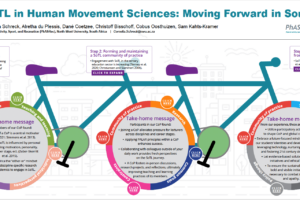
“Getting it Write” | Reflections on Co-leading the 2023 ISSOTL International Collaborative Writing Groups (ICWGs)
By Earle Abrahamson, Professor of the Scholarship of Teaching and Learning, University of Hertfordshire, UK
Embarking on a journey of collaborative writing is not merely about producing scholarly articles—it’s about forging connections, fostering communities, and navigating the intricate landscapes of academia. The traditional ICWGs have the potential to provide scholars with a space and a community of scholarly practice to design and develop a SoTL article. What is the value of collaboration? How do international SoTL scholars form communities of writing practice that produce meaningful and sustained outputs? To attempt to address these questions, I need to consider my position and role of privilege in co-leading the 2023 ISSOTL. The ISSOTL ICWGs began as a vision to enable international SoTL scholars to connect through common practice, ideals and learning and synergistically design and produce a traditional academic article. The process may appear simple, yet to ensure that writing groups are effective in their work, attention must be paid to creating and supporting these complex international communities of practice. The co-leaders are tasked with managing the process that hopefully culminates in the successful publication of an article in the ISSOTL journal – Teaching and Learning Inquiry.
Whilst co-leaders are nominated by a by a subcommittee of the Publications Committee, then sent to the ISSOTL board for approval, much independence and freedom of decision making is left in their hands to design the ICWG experience for the group leaders and group participants. The 2023 iteration used the ISSOTL conference theme of “context matters” and wove this into the narrative to recruit ICWG participants. In so doing, care was given to understanding a range of commitments in higher education, predicated on what matters most. This enabled group leaders to carefully consider topics that aligned with these general themes and ideals. With the main ICWG theme decided, the intriguing yet arduous task of recruiting group leaders began. Designing the call for group leaders involved a delicate balance between experience and exposure. The 2023 experience was predicated upon inclusive practice and creating a space to share context in a myriad of settings. Whilst it is important to have experienced group leaders, so too, is it necessary to develop pipelines to support scholars aspiring to grow and enhance their SoTL leadership skills. Who gets to take part and how they take part are key questions and directives for the co-leaders.
The setting for the in-person component for the 2023 ICWG was Utrecht, which heralds a rich history of scholarship, culture and community. There was an overwhelming response to the call for participants making it difficult to decide on who gets selected. With the primary consideration of inclusion, it was important that each group was balanced in terms of student and geographical representation coupled with colleagues new to SoTL and those more experienced in SoTL.
The ICWG experience is not solely about the academic and scholarly component but equally about the informal and social interactions that help to define its successes. In learning to “get it write” it was necessary to work closely with the host team to build the social and cultural experiences into the ICWG program. This meant deconstructing language barriers and thinking about how best to use the space and landscape as a learning dynamic. 2023 saw the introduction of a welcome pack making explicit the Dutch experience by sharing information and signposting important ICWG guidance. This was complemented by a padlet that served to introduce members and create a creative virtual landscape for sharing ideas, aspirations and key writing developments.
For those who get to participate, the experience can be novel, supportive and inclusive but equally frustrating and fraught with difficulties due mainly to group dynamics, personalities and conflicting ideas within and between groups. Understanding what works and why it works is useful in preparing future co-leaders for the ICWG experience. This takes time and care in crafting feedback questions to capture the different components of the experience. I recognise that each participant will appreciate different aspects of the experience and that one experience does not suit all. What became apparent is that careful design of the collaborative space is essential and that having breakout rooms and time for groups to work together could be the difference between success and failure.
Being part of the ICWG is a rewarding experience, but leading it requires careful consideration. Acknowledging that perfection is elusive, the value lies in giving co-leaders the initiative to form networks, discuss directions, and shape the journey. As ISSOTL continues to champion ICWGs as a flagship enterprise, there is a call to focus on supporting the processes, not just the final product. To lead effectively ones needs to be curious, courageous and committed. Leadership is a process of and for learning. It involves listening and liaising, deciding and directing, practising and promoting, but above all, brings people, practices and communities together to enable their successes through a shared experience.




